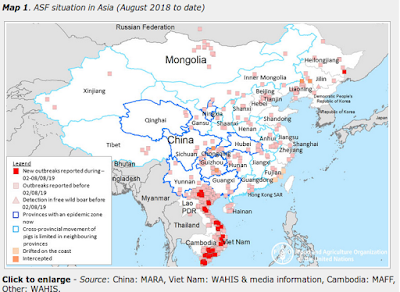#14,244
For just over a year we've been following the spread of African Swine Fever (ASF) across China - and while the official narrative (as of August 8th, 2019) is that China has reported 149 ASF outbreaks detected in 32 Provinces, resulting in the loss of roughly > 1.16 million pigs - outside sources suggest that the losses could be 100 fold (or more) higher (see African Swine Fever In China: Epizootic or An EpicZootic?).
This morning headlines from Reuters, and other news outlets, report that China's swine herd population has declined by nearly 1/3rd over the past 12 months.Digging around China's MOA website, I found the following chart showing the losses reported by the media today.
According to the FAO (cite), China is both the world’s number one producer and consumer of pork (USDA, Foreign Agriculture Services Forecast, 2017). Roughly half of the pork raised in the world comes from China.
An admitted 32% decline would be well over 100 million head, and many industry experts believe China's actual losses are higher than being reported.Other countries, including Vietnam and Mongolia, are reporting losses in excess of 10% of their swine herd, and of course, African Swine Fever shows no sign of slowing.
For now North American remains free from the ASF virus, but the more inroads it makes around the globe, the more opportunities it will have to jump into our backyard (see USDA's A qualitative assessment of the likelihood of ASF virus entry to the United States. March 2019).
While we tend to worry most about human diseases, agricultural diseases - like bird flu, swine fever, and FMD - can inflict crippling economic blows.
Add in crop failures due to increasing climate instability and a steadily growing population, and you have the ingredients for seeing increased food insecurity - and political instability - around the globe.While ASF does not pose a direct threat to human health, it's enough of an unpredictable wildcard to warrant our continued attention.

